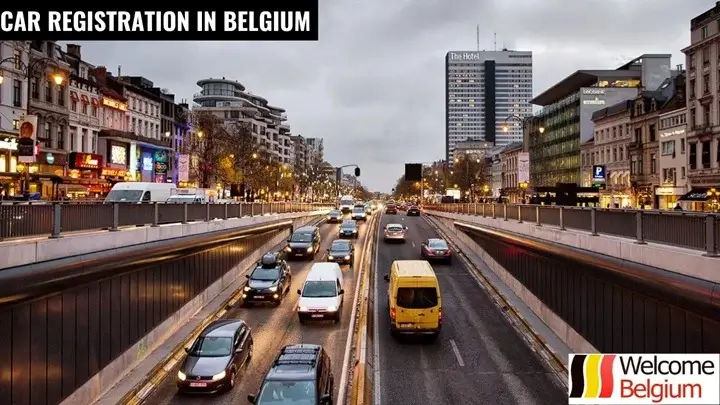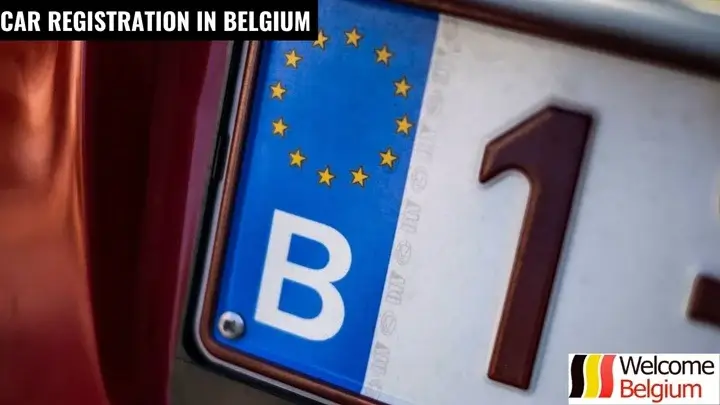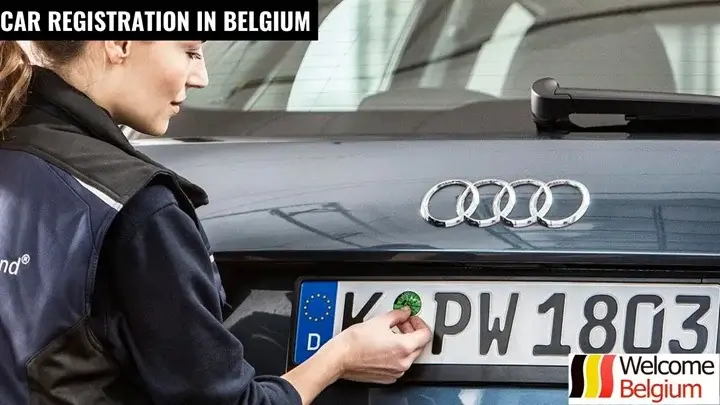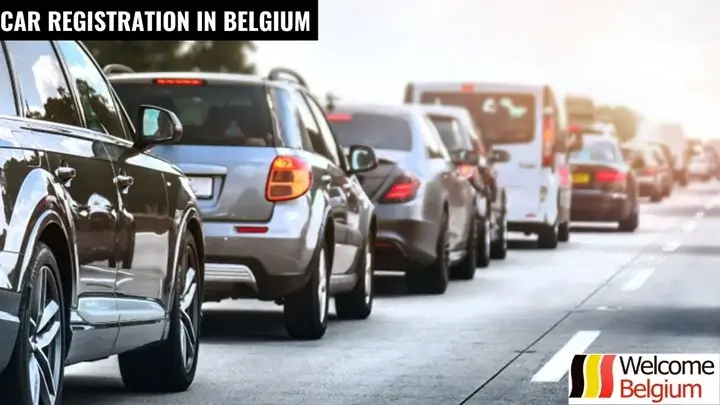Moved to Belgium and want to drive on local roads legally? You’ll have to bother with registering your car – there are no options here. In this article, we’ll tell you how it all works: what locals should do, what foreigners should do, where to get papers, how much to pay and how to save money. If you don’t want to deal with fines and running around to the authorities – read to the end.
Registration for residents of Belgium
If you have a Belgian passport or a resident card, then registering your car is a must, but it is quite doable. The main thing is not to put it off and do everything step by step: collect the necessary documents, submit the application to the right place and get a number. Here we will tell you where to go, what to take with you and how much this whole story will cost. It’s simple – if you know where to start.
Stages of car registration for citizens and permanent residents of Belgium:
- Collection of documents
You will need:- ID card or residence permit
- Proof of address (utility bill or extract from the register)
- Contract of sale and purchase of a car
- Pass Certificate (for used cars)
- Car insurance
- Technical inspection report (if the car is older than 4 years)
- Filing a claim
After purchasing insurance, you will be given a pink form (demande d’immatriculation) – it should be submitted to DIV (Direction) Immatriculation des Vehicles).
You can do this:- Through an insurance company
- In the DIV department
- Via bpost (Belgian Post)
Address of the DIV head office:
City Atrium, Rue du Progrès 56, 1210 Brussels
Phone: 02 488 30 00 Website: https://mobilit.belgium.be
- Receiving number plates
After registration, you will be sent a number plate and a registration certificate (certificat d’immatriculation) to the specified address.
The first set of number plates is sent by mail via bpost, usually within 1-2 working days. - Cost and taxes
- The registration process itself is free, but the number plate will cost around 30 euros.
- Additionally – first entry tax (TMC) and annual road tax (depending on engine power, CO₂ emissions and age of the car)
- You can calculate taxes here: https://belastingen.fgov.be
- Deadlines
Everything takes from 2 to 5 working days, if you don’t hesitate.
For delays, fines are threatened – up to 500 euros, if you drive an unregistered car.
For locals, registering a car in Belgium is a routine but not difficult task. The main thing is to do everything properly: collect documents, get insurance, and don’t forget about the technical inspection. It’s better to go through these steps once calmly than to run around and prove later that you’re not a camel. And if you forget something, services like DIV and insurance companies will almost always help.
Advice: don’t throw away your Car- Pass – you’ll need it even after a few years when you sell your car.
Registration for foreigners and immigrants
Just arrived in Belgium and want to register your car legally? Then you will have to delve into the local rules a little. Registration for visitors is a more complicated thing than for locals, but everything is quite real if you follow the steps. In this section, we will break down how to register a car imported from another country, what to do with customs and what documents you will need.
What to do if you are a foreigner or an immigrant:
Here’s a step-by-step breakdown, from entering with a car to getting license plates:
- Make sure you have a permanent or temporary address in Belgium. Without it, registration is impossible. If you are here on a visa, there may be some nuances – we will tell you below.
- Get insurance. Without it, you will not receive registration. The insurance company transfers the data to DIV, and only after that will they give you registration documents.
- Pass the technical inspection. Even if the car is new, you still need to pass it. Check that you have a Car- Pass – you can’t do without it.
Where to pass: any vehicle inspection checkpoint (contrôle technique).
Find the nearest one: www.autocontrole.be - CAR-PASS. This document confirms the car’s mileage. It is issued after the technical inspection. It is mandatory for used cars. It costs about 10 euros.
- Customs formalities and E705.
If you are importing a car from a country outside the EU, you need to clear customs and obtain form E705. Where to apply: FPS Finance (tax) — www.fin.belgium.be
They will tell you whether you need import tax (in most cases, yes). Address: Boulevard du Roi Albert II 33, 1030 Brussels
Phone: 0257 257 57 - Register your car in DIV.
You can do it through an insurance company or directly:- At the Bpost office (post office)
- Or by sending documents by mail to DIV
DIV address: Rue du Progrès 56, 1210 Bruxelles
Waiting time: 3 to 10 working days Standard registration cost: around 30–40 euros, delivery of the number plate +30 euros
What if you have a temporary visa or are a student?
If you don’t plan to stay in the country for a long time, you will still have to register your car if your stay exceeds 6 months. Sometimes you can get temporary registration, but it is better to check with the consulate or local commune. Students can count on a simplified procedure, especially if the car is registered in the EU.
Registering a car in Belgium for foreigners is not that difficult if you know where to go and what to pack. The main thing is not to delay the registration, because the fines here are considerable. If you do everything correctly, you can safely drive on Belgian roads in a couple of weeks. And if you have any doubts, it is better to immediately consult with the local commune or insurance company.
Advice: if the car was registered in the EU, the procedure will be simpler and cheaper – without customs and with a simplified technical inspection.
Temporary registration (W -plate)
If you plan to bring your car to Belgium for a short period of time or are only in the country temporarily, a temporary registration, or W-plate, will suit you. This is a solution for those who are not going to stay in Belgium for a long time, but still want to drive their car legally. In this section, we will look at who can get a temporary registration, how to do it, and how it differs from a regular one.
Stages of temporary registration:
- Documents required for W-plate:
- Passport or ID card
- Proof that you are temporarily staying in Belgium (e.g. visa, work or study visa)
- Car insurance
- Sales contract or documents confirming ownership of the vehicle
- Vehicle registration document (if available)
- Where to apply:
- Local DIV (Duty Vehicle Registration Office) offices
- Address: please indicate the nearest office on the DIV website
- Phone: contact number on the website
- Website: https://www.belgium.be
- Cost of service:
- The cost of temporary registration depends on the region, but on average ranges from 20 to 50 euros.
- Waiting time:
- Typically, temporary registration is processed within 1-2 business days.
- Difference from regular registration:
- Temporary registration (W-plate) gives the right to use the car only for a temporary period (up to 1 year).
- Unlike permanent registration, it cannot be extended, and at the end of the term you must either export the car from the country or apply for regular registration.
Temporary registration is the ideal option for those who have come for a short period and do not plan to stay in Belgium forever. So, if your car has arrived with you, you can safely drive around the country without worrying about fines.
Tip: Remember that temporary registration is valid for a maximum of 1 year and is not extended, so if you decide to stay longer, you will have to re-register the car.
Exceptions and special cases
It is not always necessary to go through the entire registration procedure. In Belgium, there are exceptions that can make life much easier if you fall into one of these categories. For example, if you are a diplomat, a tenant with full registration for a company, or even a temporary resident. In this section, we will discuss when registration is not required, what are the special features when changing your place of residence in Belgium, and what you should pay attention to in order to avoid awkward situations.
When registration is not required:
- Diplomatic cars. If you work in a diplomatic mission, your car may be exempt from mandatory registration in Belgium. But one thing is important here. The car must be registered in the country of your origin and with your diplomatic status.
- Rent with full registration to the company. If you rent a car, and for some reason the registration is issued to the company, then you do not need to go through the whole process personally. The car remains registered with the company, and you do not delve into the bureaucracy.
- Temporary residents. People who have a temporary residence permit or stay in Belgium may not register their car immediately. For example, if you come to work for a few months, the car may remain registered in your country, but on the condition that you do not stay in Belgium for long.
- If you come to Belgium as a tourist and do not plan to live here for a long time, you do not need to register your car. The main thing is to remember that such rules are valid for no more than 6 months.
What to do when changing your place of residence within Belgium:
- If you move within the country, you will need to update your registration. There will be no additional checks or taxes, but the new address must be reported to the relevant authorities.
- If you have changed your place of residence, you must notify the vehicle registration service within a month of the move. There will be no problems here, as long as you remember to update the data in time.
Possible problems and subtleties when registering:
- Mistakes in documents. One of the most common misunderstandings is when documents are not filled out completely or with mistakes. Be careful when submitting applications so as not to get into a situation where everything needs to be redone.
- Online registration. Sometimes you can register a car online, but there is a risk that the system will not accept the data if it does not match the real one. It is always better to check that everything is done correctly.
If you fall into one of the categories where registration is not required, you can breathe a sigh of relief and not worry. However, even in such cases, it is better to be prepared for the peculiarities and study all the intricacies in advance. The Belgian car registration system may seem complicated, but with the right approach, you can easily figure it out.
In conclusion, it is worth noting that the process of registering a car in Belgium may seem confusing, but with the right approach it becomes quite clear and doable. The main thing is not to forget about the deadlines and requirements, which depend on your status and circumstances. If you follow all the recommendations and take into account possible exceptions, registration will take place without unnecessary hassle. Belgian bureaucracy may require attention, but it is quite transparent if you approach the matter wisely.






